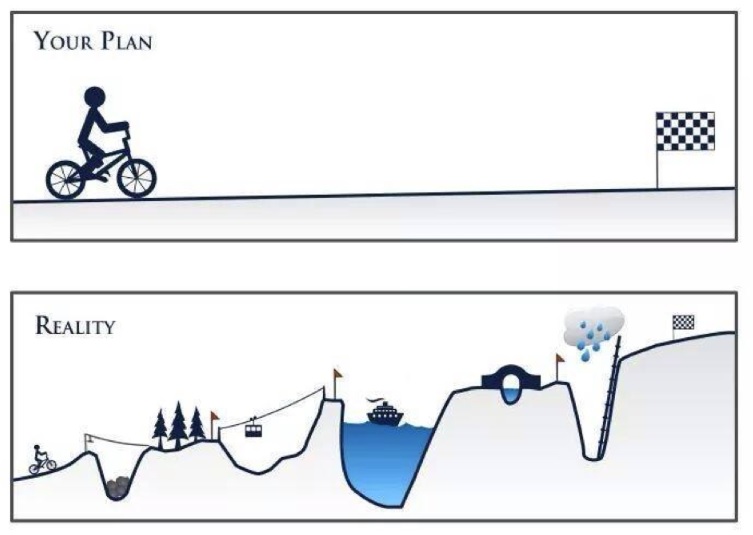Avoiding Groupthink (Part 2 of 3)
Last week in Part 1 of our “Avoiding Groupthink” series, we talked about being a Personal Finance Superhuman. Now it’s time to talk about the personal/professional development side of the equation. How do we maximize our life experiences to become the best and happiest version of ourselves? In today’s world this is proving quite a challenge.
THE REALITY
The United States has a happiness problem and a serious lack of passion. Life is sensationalized in the shows we watch: the fictional characters’ homes are larger, cars are flashier, and vacations are more lavish than our own. Pair that with the never-ending life highlights of our friends and internet personalities delivered to our social media feeds on a daily basis and we have a recipe for imbalance. As a result, our expectations of life are so much higher than reality. Think of it this way:

The clash of our high expectations with reality is hitting those of us in the United States very hard. According to the Centers for Disease Control, suicide rates have increased in nearly every state over the past two decades, and half of the states have seen suicide rates go up more than 30 percent. We have to find satisfaction and happiness in life; there is no silver bullet here. But how?
We interrupt this piece for a Public Service Announcement: If you or someone you know are going through challenges and struggling to find hope please reach out to the National Suicide Prevention Lifeline, call 1-800-273-TALK (8255).
THE PREVAILING GROUPTHINK
It is true that we have a growing shortage of happiness in America. If that’s the dark side of what is going on, then the prevailing groupthink is that we’ll be happy once we’ve found our passion. Dozens upon dozens of books, blogs, and podcasts are dedicated to this topic.
“Find your passion” is terrible advice, and here are four reasons why. First, your passion(s) often change over time. Passion is NOT a plan, it is a feeling. At 19, I really liked fast cars and car audio (think loud speakers and heavy bass); these days, I couldn’t care less about either. Where would I be if I had gone all-in on that? Second, passions are difficult to prioritize. Do I like math more than engineering? Am I better at spreadsheets or writing? It seems strange to prioritize one thing over all others and devote yourself entirely to it. Third, people are NOT always good at their passions. You may love playing basketball but lack the talent necessary to compete in the NBA. You may really love to sing but not be built for the competition of American Idol or the record industry. Finally and probably most importantly, “follow your passion” is very self-centered advice: it places me at the center of the universe. A better focus would be to “follow your contribution” which flips the idea on its head and makes it more outwardly focused. What can I do to provide value back into the world, which is going to inherently make me feel more content?
Need more? Here is a great TED Talk by Terri Trespicio called “Stop searching for your passion”. It will further cement the belief that we as a society are misguiding people when we say “just follow your passion”.
YOUR BEST PERSONAL SELF
So how do we become our best personal self? A mentor once told me, “If you can’t answer ‘yes’ to the following two questions, it’s time to make a change and do something different: 1. Do I feel needed? 2. Am I growing?”
Success fuels passion, not the other way around. We have to feel like we are growing and we have to feel like what we are doing means something to someone. If the answer to either of the questions above is “no”, it’s likely time for a life change. In a previous piece, we talked about Maslow’s Hierarchy of Needs, our desire for being comfortable, and how we should stop living in the middle. The majority of Americans may think they are happy or satisfied but are nonetheless living in the middle. This is a place of coasting, not of growth. The middle is where we feel like our contribution is not valued and/or that we are not personally challenging ourselves and growing. To our own dismay, we still seem willing to trade the time for the dollars to keep our chosen lifestyle, even if it is no longer fulfilling and borderline soul-sucking terrible.
**Action: Develop a personal development growth plan, one that provides value to others while allowing you to grow and learn. You have a right to be successful, and please never settle for the middle.**
How do you develop a personal development growth plan?
- Start with the end in mind – What’s your Dream State?
- Complete a self audit – Zig Ziglar’s Wheel of Life
- Find a mentor – Look for like-minded individuals
- Make incremental progress and track – Update your Dream Board often
- Be extremely patient!
In closing, when you begin implementing your plan, please remember to enjoy the highs and lows of the journey. If you aren’t prepared for that mentality, you need to be. Correctly set the expectation low for your plan, and prepare for the reality of the journey to success. But make sure you are always moving forward. This is my favorite graphic to represent that:



